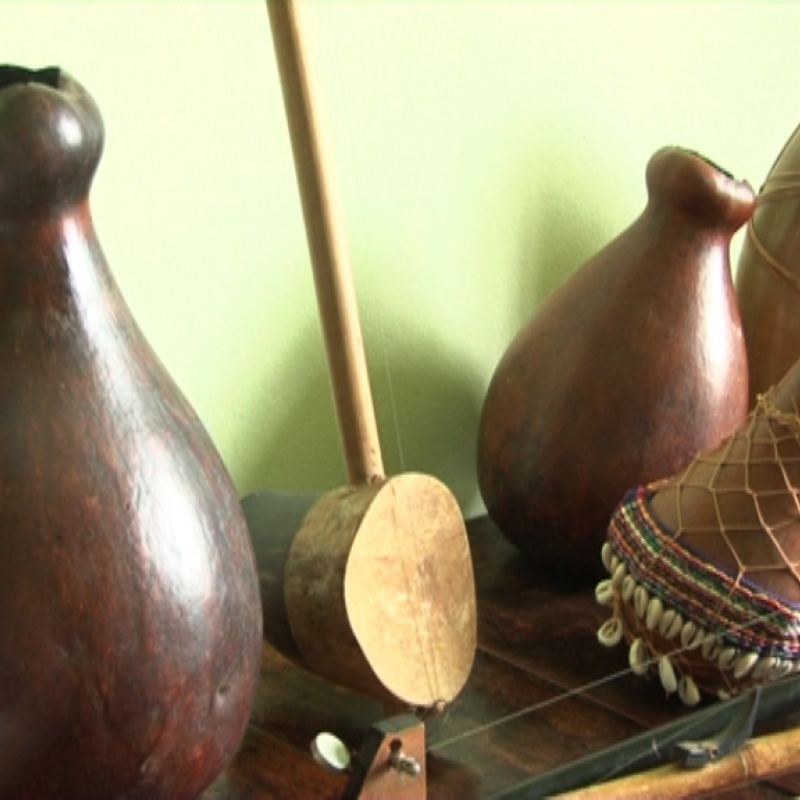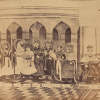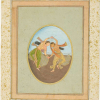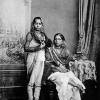Li is a way of life. It is popularly sung at festivals and is also a form of folk media through which cultural values are passed down through generations. I talked about the dying art of the Chokri Li (folk songs) with my friend Mr Ruyosuyi D.Vadeo. We discussed how unfortunate it is that this priceless cultural heritage is endangered today as few sing it, there is insufficient documentation and less importance is given to it.
The Chokri Li accompanied by the Libuh has rich and beautiful melodies to offer. I realised all is not lost when I was presented with a Li collection sung by a group from Sakraba village. For instance the Sakraba village duet called Nohu Li, meaning ‘A song of courting’ has the magnificence of Li’s lyrical romanticism.
As I listened to the duo, both holding the Libuh in their hands with the melody of the agrarian lifestyle flowing through lyrics, they enthrall the listener with the following lines:
Ha to ti
Ha so nu di zhole … and so on
Translation
As the rain and storm approaches from the south, the duo in partnership conspire to pack their picnic baskets and go courting at night. It has a romantic tinge with a beautiful melody in duet.
The duo both strumming their instrument sing the refrain:
To ti
To ti
Ha to ti
Ha so nu di zhole … and so on
I also listened to another Li which has Libuh accompaniment. It was a song dedicated to the memory of a departed husband. Listening to this Li, it dawned on me how beautiful the Chokri Li melodies are and I wondered how I could help preserve these rare original masterpieces.
The rising popularity of Li fusion music
At a time when the very existence of Li is threatened by the influence of various types of modern music styles, the four Tetseo sisters—Alüne (Lulu), Kuvelü (Kuku), Mütsevelü (Mercy) and Azi Tetseo—have proudly kept the legacy of Li alive. After being cajoled to learn Li by their mother Shetsulu, the sisters gradually birthed a Li fusion band in 1994 known as the Tetseo Sisters. Although, not immune from the criticism of not maintaining authenticity, today they have made a niche for their themselves and are popular not only in the state or nation but have also spread this music across the world.
Having plenty of folklore, Li carry stories in unique and inimitable melodies. Some are accompanied by the instrument Libuh. Popular Li are on a vast variety of subjects. It could be about love, pounding rice, lifting heavy loads, weaving, hunting and even historical accounts of events or warriors. ‘O Rhosi’, a popular traditional Li (sung by the Tetseo Sisters in modern fusion) is about being thankful for one’s good health and youth. Rhosi is a wild flower that grows throughout the year in the Phek District of Nagaland.
The sisters weave in English and Hindi with their native tongue. According to Mercy Tetseo, ‘Music does not require a language. People connect with the harmonies and melodies.’
In conclusion, I present to the reader translations of two popular folk songs (agrarian) from the villages of Porba and Sakraba in Phek district with contributions by a friend, Nukusa Vadeo.
Title of Song: Nyokro Küvü Chele (Song of pulverising the field)
Language: Chokri
Li Location: Sakraba Village, Dist-Phek, Nagaland-797 107
This song is usually sing by a group of women/men folk/morung in traditional attire during breaking of clod and pulverisation of soil in a field.
|
Lyrics of song |
Meaning |
|
*Hi-i ho-i(hi-i ho-i), Hi-i ho-i(hi-i ho-i) 1. Hülü-ü natsih(hülü-ü natsih), Hülü-ü natsih(hülü-ü natsih) Hizo ta-e ho-o le-ü(hizo ta-e ho-o le-ü), Hizo ta-e ho-o le-ü(hizo ta-e ho-o le-ü) Ho-o ha-e ho-o(ho-o ha-e ho-o) Hi zhale-ü ho-yi(hi zhale-ü ho-yi) Ho-o hoh(ho-o heh) Hi-i ho-i(hi-i ho-i), Hi-i ho-i(hi-i ho-i) Ho-o hi-ü ho-o he-ü(ho-o heh) Hi-i ho-i(hi-i ho-i), Hi-i ho-i(hi-i ho-i), hi-I ho-i Repeat (1) 2. Uko-ü ta-e zho(uko-ü ta-e zho), Uko-ü ta-e zho(uko-ü ta-e zho) Mirüsa-ü mo-o le-ü(mi rüsa-ü mo-o leü), Mirüsa-ü mo-o le-ü(mi rüsa-ü mo-o leü) Ho-o ha-e ho-o(ho-o ha-e ho-o) Hi zhale-ü ho-yi(hi zhale-ü ho-yi) Ho-o hoh(ho-o heh) Hi-i ho-i(hi-i ho-i), Hi-i ho-i(hi-i ho-i) Ho-o hi-ü ho-o he-ü(ho-o heh) Hi-i ho-i(hi-i ho-i), Hi-i ho-i(hi-i ho-i), hi-I ho-i Repeat (2) 3. Do mü-ü cho-e ri(do mü-ü cho-e ri), Do mü-ü cho-e ri(do mü-ü cho-e ri) Rünyive-ü mo-o le-ü(rünyive-ü mo-o leü), Rünyive-ü mo-o le-ü(rünyive-ü mo-o leü) Ho-o ha-e ho-o(ho-o ha-e ho-o) Hi zhale-ü ho-yi(hi zhale-ü ho-yi) Ho-o hoh(ho-o heh) Hi-i ho-i(hi-i ho-i), Hi-i ho-i(hi-i ho-i) Ho-o hi-ü ho-o he-ü(ho-o heh)
|
*Hi-i ho-i(hi-i ho-i), Hi-i ho-i(hi-i ho-i)(Folk tune) 1. Will not remain young (Sung by the lead singers)2 Will not remain young (Sung by the followers)2 Like this forever(Sung by the lead singers)2 Like this forever(Sung by the followers)2 Ho-o ha-e ho-o(ho-o ha-e ho-o)(Folk tune) Hi zhale-ü ho-yi(hi zhale-ü ho-yi)(Folk tune) Ho-o hoh(ho-o heh)(Folk tune) Hi-i ho-i(hi-i ho-i), Hi-i ho-i(hi-i ho-i)(Folk tune) Ho-o hi-ü ho-o he-ü(ho-o heh)(Folk tune) Hi-i ho-i(hi-i ho-i), Hi-i ho-i(hi-i ho-i), hi-I ho-i(Folk tune) Repeat (1) 2. If we are together (Sung by the lead singers)2 If we are together (Sung by the followers)2 We don’t long for others(Sung by the lead singers)2 We don’t long for others(Sung by the followers)2 Ho-o ha-e ho-o(ho-o ha-e ho-o) (Folk tune) Hi zhale-ü ho-yi(hi zhale-ü ho-yi) (Folk tune) Ho-o hoh(ho-o heh)(Folk tune) Hi-i ho-i(hi-i ho-i), Hi-i ho-i(hi-i ho-i) (Folk tune) Ho-o hi-ü ho-o he-ü(ho-o heh) (Folk tune) Hi-i ho-i(hi-i ho-i), Hi-i ho-i(hi-i ho-i), hi-I ho-i(Folk tune) Repeat (2) 3. Singing too lengthy(Sung by the lead singers)2 Singing too lengthy (Sung by the followers)2 is not sweet to hear(Sung by the lead singers)2is not sweet to hear (Sung by the followers)2 Hi zhale-ü ho-yi(hi zhale-ü ho-yi) (Folk tune) Ho-o hi-ü ho-o he-ü(ho-o heh) (Folk tune) Hi-i ho-i(hi-i ho-i), Hi-i ho-i(hi-i ho-i), hi-I ho-i(Folk tune) Repeat (3) |
|
|
|
2. Title of Song: Chüte Chele (Song of Sowing Millet)
Language: Chokri
Li Location: Porba Village, Dist-Phek, Nagaland-797 107
This song is usually sing during the ploughing and sowing of millet in a field by young unmarried partners in full traditional attire.
|
Lyrics of song |
Meaning |
|
Hiyo he-ü(hiyo he-ü), Hiyo he-ü(hiyo he-ü) 1. Hi thatüso hi-ü hi dirihanü ye Hi zha-ü ho-ü ho-ü 2. Hi lüshüyori hi shevotso ho le Ho-o oh-ü, ho-o ho-o 3. Hi di küthicenatsihhamothiye 4. Hi khreküsanu hi hayetolumo Oh zhale oh-ü he-ü During lunch break: (First partner) Hiyo-ü he 1. Naceküchozhohanülümüdo Hihozhale-ü hi-ü lohe le hi he-ü Naceküchozhohanülümüdo Zhale-ü ho-o zhalehelü hi-ü zho-ü Ho zhale-ü he-ü Second Partner: Sopühlüshüzhosopühlümonye Hihozhale-ü hi-ü lohe le hi he-ü Sopühlüshüzhosopühlümonye Zhale-ü ho-o zhalehelü hi-ü zho-ü Ho zhale-ü he-ü First partner: Hihozhale-ü hi-ü lohe le hi he-ü No hanülü, zhoküve mi nülü Zhale-ü ho-o zhalehelü hi-ü zho-ü Ho zhale-ü he-ü Second Partner: Münyedirizhohajoko ho le Hihozhale-ü hi-ü lohe le hi he-ü Münyedirizhohajoko ho le Zhale-ü ho-o zhalehelü hi-ü zho-ü Ho zhale-ü he-ü
*Hiyo he-ü(hiyo he-ü), Hiyo he-ü(hiyo he-ü) 1. Hi thatüso hi-ü hi dirihanü ye Hi zha-ü ho-ü ho-ü 2. Hi lüshüyori hi shevotso ho le Ho-o oh-ü, ho-o ho-o 3. Hi di küthicenatsihhamothiye 4. Hi khreküsanu hi hayetolumo Oh zhale oh-ü he-ü During lunch break: (First partner) Hiyo-ü he 1. Naceküchozhohanülümüdo Hihozhale-ü hi-ü lohe le hi he-ü Naceküchozhohanülümüdo Zhale-ü ho-o zhalehelü hi-ü zho-ü Ho zhale-ü he-ü Second Partner: Sopühlüshüzhosopühlümonye Hihozhale-ü hi-ü lohe le hi he-ü Sopühlüshüzhosopühlümonye Zhale-ü ho-o zhalehelü hi-ü zho-ü Ho zhale-ü he-ü First partner: Hihozhale-ü hi-ü lohe le hi he-ü No hanülü, zhoküve mi nülü Zhale-ü ho-o zhalehelü hi-ü zho-ü Ho zhale-ü he-ü Second Partner: Münyedirizhohajoko ho le Hihozhale-ü hi-ü lohe le hi he-ü Münyedirizhohajoko ho le Zhale-ü ho-o zhalehelü hi-ü zho-ü Ho zhale-ü he-ü
|
Hiyo he-ü(hiyo he-ü), Hiyo he-ü(hiyo he-ü) (introduction) Hi zha-ü ho-ü ho-ü(folktune) (folktune) Hiyo he-ü(hiyo he-ü), Hiyo he-ü(hiyo he-ü) (introduction) 2. Love is difficult to define Hi zha-ü ho-ü ho-ü (folktune) Ho-o oh-ü, ho-o ho-o (folktune) Oh zhale oh-ü he-ü (folktune) 1. How lovely is the day today Hi zha-ü ho-ü ho-ü(folktune) (folktune) 2. Love is difficult to define Hi zha-ü ho-ü ho-ü (folktune) Ho-o oh-ü, ho-o ho-o (folktune) Oh zhale oh-ü he-ü (folktune) Hiyo he-ü(hiyo he-ü), Hiyo he-ü(hiyo he-ü) (folktune) 3.Young was the time when we do anything we like Hi zha-ü ho-ü ho-ü(folktune) (folktune) 4.Younger generation will overtake us again Hi zha-ü ho-ü ho-ü (folktune) *During lunch break time, a pair of partner use to sing trying to dominate each other in singing* Hiyo-ü he (folktune) 1. Thinking of my lover the whole day Hihozhale-ü hi-ü lohe le hi he-ü(folktune) Thinking of my lover the whole day Zhale-ü ho-o zhalehelü hi-ü zho-ü (folktune) Ho zhale-ü he-ü (folktune) Second Partner: Who will not think of love and remember Hihozhale-ü hi-ü lohe le hi he-ü(folktune) Who will not think of love and remember Zhale-ü ho-o zhalehelü hi-ü zho-ü(folktune) Ho zhale-ü he-ü(folktune) First partner: others Hihozhale-ü hi-ü lohe le hi he-ü You are pretty to me and to all others Ho zhale-ü he-ü(folktune) Second Partner: Feel your beauty even in your absence Hihozhale-ü hi-ü lohe le hi he-ü Feel your beauty even in your absence Zhale-ü ho-o zhalehelü hi-ü zho-ü (folktune) Ho zhale-ü he-ü(folktune) |












